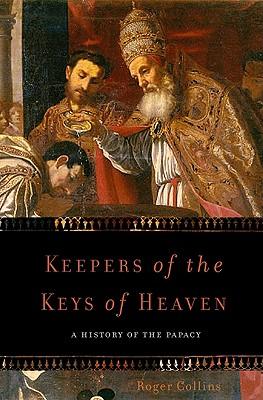Full Product Details
Author: Roger Collins
Publisher: Basic Books
Imprint: Basic Books
Dimensions:
Width: 15.60cm
, Height: 4.70cm
, Length: 23.60cm
Weight: 0.862kg
ISBN: 9780465011957
ISBN 10: 0465011950
Pages: 576
Publication Date: 01 March 2009
Audience:
General/trade
,
General
Format: Hardback
Publisher's Status: Out of Stock Indefinitely
Availability: In Print

Limited stock is available. It will be ordered for you and shipped pending supplier's limited stock.
Reviews
Alexander McCall Smith<br> Keepers of the Keys of Heaven is an immensely readable treatment of one of the world's most important institutions. Few historians write as engagingly and wittily as Roger Collins. There is not a dull word in this spectacular triumph of accessible scholarship. <br><br> History Magazine <br> Drawing on Vatican archives, accounts from papal ambassadors, spies and historians, the character and policies of the popes, from the obscure to the celebrated, are explained. Collins also addresses the crisis of the Reformation and current debates on the future of the Church, and presents an objective, revealing account of the impact and growth of the pope's power. <br><br> Theological Studies <br> The book is a good read; its prose is vigorous and limpid. [Collins] has a good eye for some types of narrative detail, such as delightful factoids of papal history, the ins and outs of papal elections and the maneuverings of cardinals.
Alexander McCall Smith Keepers of the Keys of Heaven is an immensely readable treatment of one of the world's most important institutions. Few historians write as engagingly and wittily as Roger Collins. There is not a dull word in this spectacular triumph of accessible scholarship. History Magazine Drawing on Vatican archives, accounts from papal ambassadors, spies and historians, the character and policies of the popes, from the obscure to the celebrated, are explained. Collins also addresses the crisis of the Reformation and current debates on the future of the Church, and presents an objective, revealing account of the impact and growth of the pope's power. Theological Studies The book is a good read; its prose is vigorous and limpid. [Collins] has a good eye for some types of narrative detail, such as delightful factoids of papal history, the ins and outs of papal elections and the maneuverings of cardinals.
The history of a 2,000-year-old office whose holders have shaped world history, from St. Peter to Benedict XVI.Roman Catholic tradition identifies popes as the successors to Peter, who supposedly was - or at least helped appoint - the first bishop of Rome. Yet in fact Christianity had no bishops until well after Peter's death, notes Collins (Research Fellow/Univ. of Edinburgh; Visigothic Spain, 2004, etc.). This kind of mythologizing has carried the papacy through numerous near-death experiences. Secular protectors, extraordinary pontiffs and luck (or providence, depending on your take) have also played a part in helping popes expand their spiritual authority even as their temporal powers shriveled. The narrative covers such epic events as the schism between Rome and Eastern Christianity, the Crusades, church councils and the Protestant Reformation. But it does not neglect peculiarities like the Cadaver Synod, in which a medieval pope's enemies exhumed his corpse, arrayed it in robes before an ecclesiastical court and convicted the moldering remains of perjury and breaking canon law. Collins sprints through the centuries, but his detail-saturated prose makes the book seem long. Grand themes bob in a sea of names and dates, with even insignificant popes and other bit players rating fleeting mentions. The author's conclusions on major, controversial figures are invariably balanced. He judges as far from proven the case against Pius XII, whose failure to condemn the Nazis' treatment of Jews led historian John Cornwell to dub him Hitler's Pope (1999). Collins does acknowledge that Pius was at the very least constrained by the habitual caution that made him a good Vatican diplomat rather than a natural leader of men in time of crisis. John Paul II gets kudos for charisma and combating communism, but criticism for opposing artificial contraception to halt AIDS and inertia in the face of sex abuse by priests.A useful reference for students and diehard fans of church history, but includes more than general readers will want to know. (Kirkus Reviews)
Author Information
Roger Collins is Research Fellow of the School of History, Classics, and Archaeology at the University of Edinburgh. The author of numerous books and articles in the field of religious history, he lives in Edinburgh.



